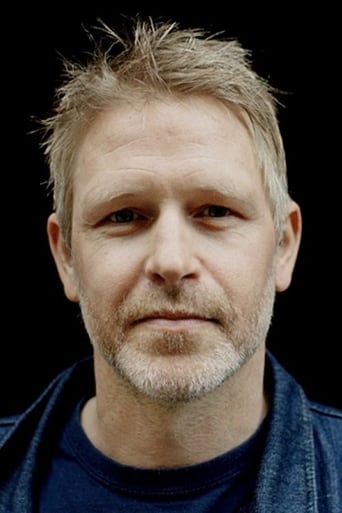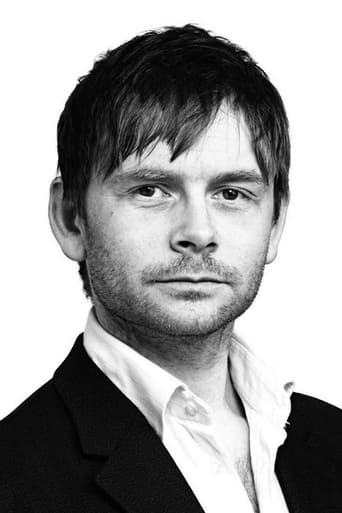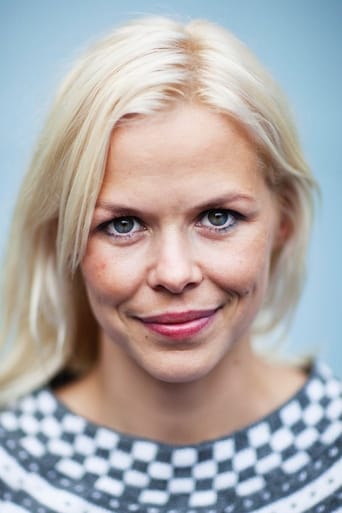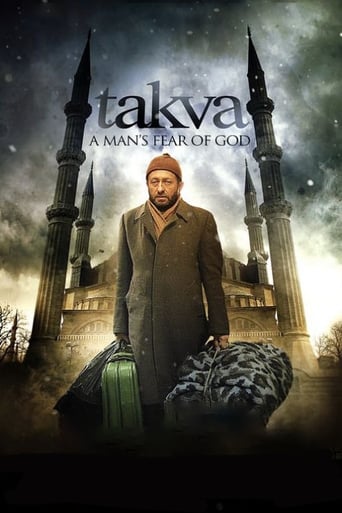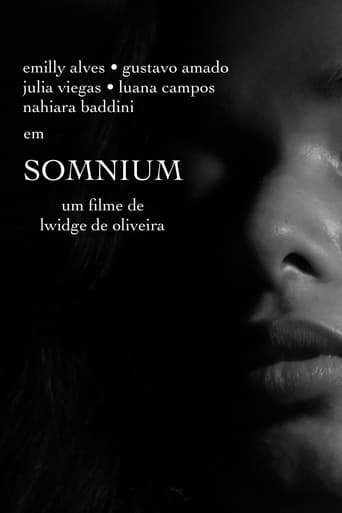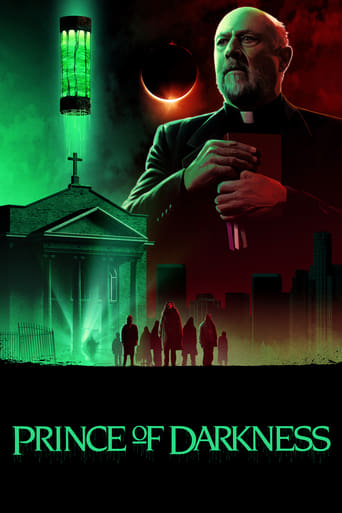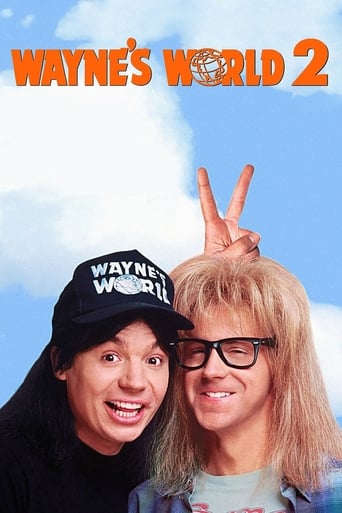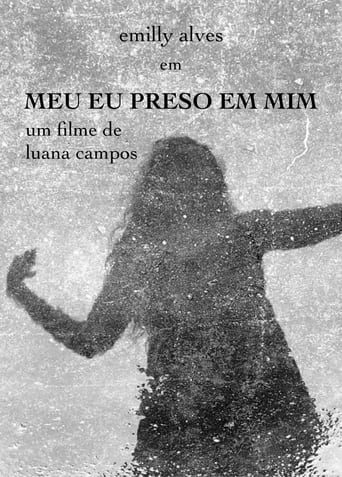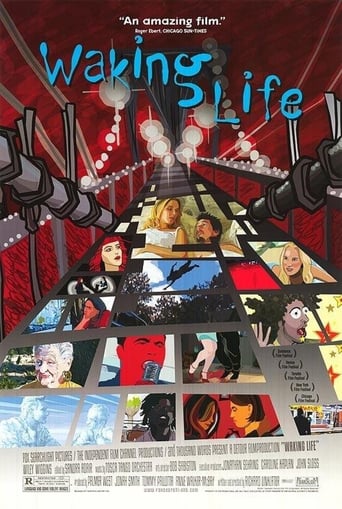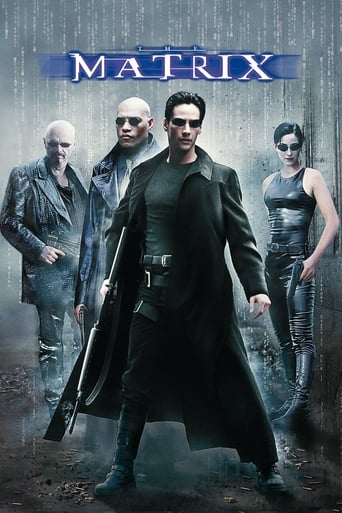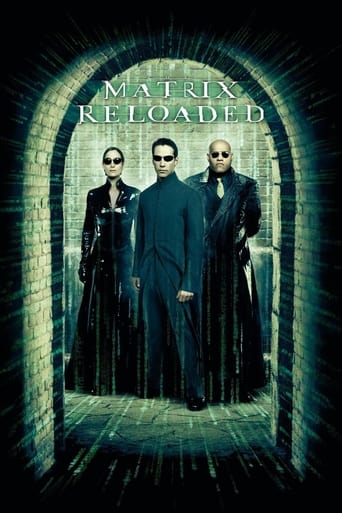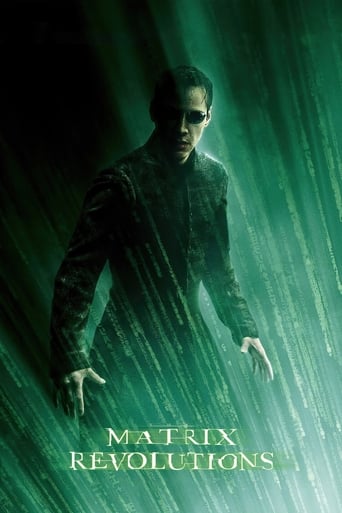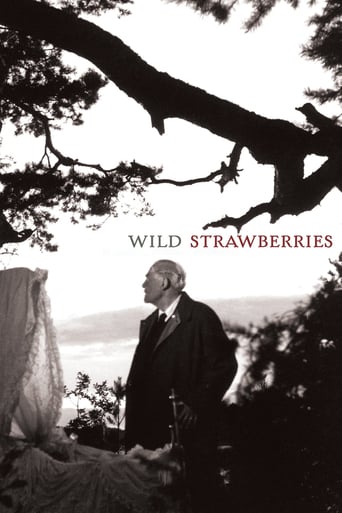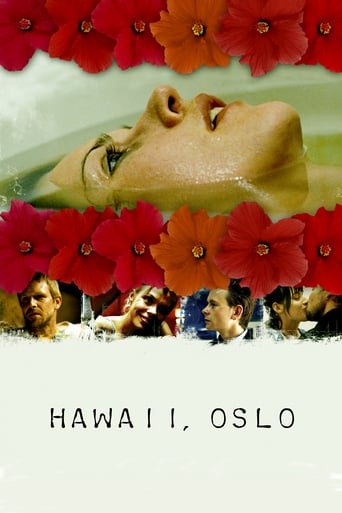
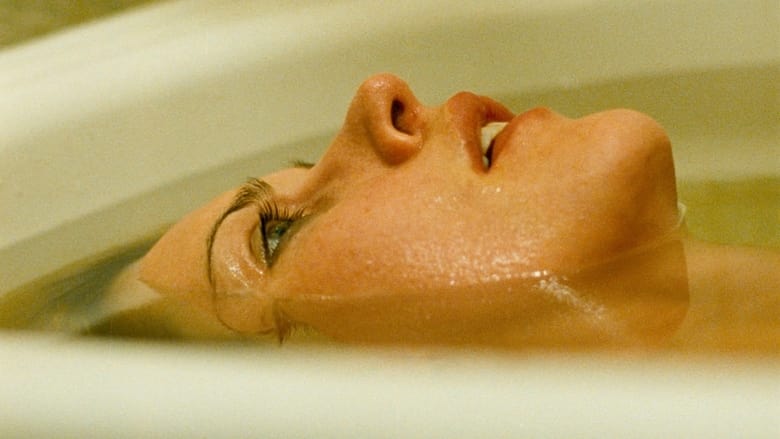
Hawaii, Oslo (2004)
Hawaii, Oslo is the story of a handful of people who cross each other's path without necessarily knowing each other, during the hottest day of the year, in Oslo. We follow Frode and Milla. They are having their first child, who they are told will not live long. We follow Bobbie-Pop, a faded singer who tries to commit suicide. We follow Leon, an institutionalized kleptomaniac who is loking for Åsa, to whom he has a ten year old deal to get married. We meet Leon's brother, Trygve, who fetches Leon at the institution to celebrate his birthday, but who himself has plans to use his leave from prison to run away. And most of all we meet the angel Vidar, Leon's best buddy at the institution, who sees things no one else can see, and who may be able to save everyone - except himself?
Watch Trailer
Cast


Similar titles
Reviews
Erik Poppe's Hawaii, Oslo (2004) catapults into a four-branched plot line when a psychiatric ward guardian – Vidar – awakes from a dark prophetic dream, in which a friend of his is hit by an ambulance and killed. In the dream a man runs along the streets of Oslo and is hit suddenly by an ambulance. Each character featured in the film approaches the dying man on the street to find out what has happened. The film then unfolds in a manner that reveals to us the background of each character, as well as their role in the prophecy dreamt by Vidar.While the branches of the plot are linked together through Vidar in his pursuit to rectify the fate he has foreseen, the characters from each corner of the film don't really interact in substantial ways in day-to-day life. Their stories are connected, although they themselves are not. However, they are connected in ways beyond their revolving around Vidar. Themes pop up in repeated places, showing the viewer what these people have in common. Brotherly relations, for one, are heavily focused upon. Both sets of brothers, Leon/Trygve and Mikkel/Magne, pair a dominant, yet broken elder brother with an inferior, misunderstood, and wise little brother. Both Leon and Magne are dominated by their elder brothers, as they appear to be falling apart more visibly at the surface. However, we soon see that although he may take more charge in attempting to control his own life than Leon does, Trygve is the truly broken and lost sibling. Additionally, Mikkel represses emotion as a coping mechanism. Both elder brothers suppress their more emotionally in-touch younger brothers as a means by which to exert control over something in their lives. Poppe intelligently deconstructs this relationship by providing us with examples of this theme at two different stages of life – boyhood and adulthood.We also see two paralleled parenthoods. Mille and Frode feud over how to approach the nearing death of their newborn son. Frode does everything possible to prevent it, even when doctors and his spouse alike tell him the baby cannot be saved. Mille focuses on spending as much time with her baby boy as she can, so Frode must have hope enough for the both of them. "You need to stop dreaming. You need to wake up!" says Mille. "I am awake! Listen to yourself!" replies Frode. When the doctor tells the couple he cannot morally advise them to explore this experimental procedure, Frode explodes, "So we should just give up?!" With conflicting viewpoints, the couple works through the adversity confronting them.Meanwhile, Tina gives up all hope on her own life and attempts to commit suicide, only to be revived and find out that her former lover has passed away. Deciding that her children now need her in their lives, she sets out to forsake her own desire to die in order to be present for her boys. Life and death sit at the forefront of these two familial livelihoods, but the theme remains the same: There is an innate human need for parents to do anything possible for their children. While these family units strive to become whole in their respective story lines, we see Asa and Leon work to fulfill a marriage pact made over a decade ago. The prospect of love and happiness are what drives these two characters from the start of the film. Leon thus resolves the brother theme by deciding to reject his role as inferior, and take over his own life. What better way to depict this rejection of the inferior brother role than to present his character with the opportunity for romantic love? Choosing a successful loving relationship over a dysfunctional one, Leon selects Asa's Hawaii rather than the one Trygve presents him with. He also becomes linked with Frode and Mille as he embarks on a romantic partnership, and all the themes related to achieving a successful one. From a filmic standpoint, taking on this many characters and story lines can be daunting for the filmmaker. But Poppe rises to the occasion, effectively utilizing every last moment of screen time for each person in the film. As tensions rise, and the climax arrives in each situation, Poppe strategically cuts from storyline to storyline. Just when we are hungry for more from Frode and Mille, we are presented with Magne and Mikkel's struggle. Frustrated perhaps at first with the jarring transition, we quickly remember that we had to be torn away from Magne and Mikkel as well. The viewer never feels spread too thinly among these stories, but rather intrigued and compelled by each one all the way through. Poppe's use of effective dialogue (not too much and never too little), as well as his succinct introduction to the characters coagulates to effectively form a well-constructed and interesting set of players. We know just as much as we need to about each character, but we always want to know more due to how beautiful and engaging we find them. Poppe smartly creates a character solar system, in which every character revolves around a prophet named Vidar. Yet, he takes it one step further by creating thematic links among these well-constructed characters. This intelligent web he has spun not only makes for an intriguing, heart-wrenching human story, but also shows the viewer that people are connected in more ways than they may know, or ever even see. With the cornucopia of events set before us, very viewer can find a character, relationship, or situation with which to relate. The audience can go from there in order to see how different situations and relationships, as polar as they may seem, have a surprising amount in common. Underlying each of these thematic events and existences is the concept of human control over fate, something every living person ponders at some point or other in their lives.
Within the happenings of a twenty-four hour time period, the saying "what a small world" is perfectly captured by director Erik Poppe in this multi award winning film, Hawii, Oslo. The Norwegian film released in 2004 delivers a thrilling plot with a mix of people crossing each other's paths one way or another. Amongst multitude of events all happening during the sweltering hot 24-hours in Oslo, Poppe utilizes various creative filming techniques and intense, emotion-triggering music to make the viewer remember this day they watch on screen forever.We are introduced to Leon, a man living in an institution, waiting hopefully on his birthday for the arrival of Asa, the lady he promised to marry ten years back. While waiting for her arrival, Leon's brother, in prison for armed robbery, is allowed to go visit and celebrate the day with Leon. Though the prison puts trust in him to visit Leon, he has a secret plan to rob a bank and flee with his brother. As Asa makes her way to reunite with Leon she comes across two young boys, Magne and Mikkel, extremely lost in the world while processing their father's death and about to be separated by the foster care system, who steal her purse. Asa catches Magne, the younger of the two boys, and comes to find the disaster of an apartment and poor conditions the boys have been living in. A little later in the film, the boys' mother, whom recently attempted suicide, appears at the father's funeral because of the notice Magnus leaves her. We also encounter Frode, Milla, and their newborn son Aaron, who has a serious heart defect in need of an expensive surgery. Frode holds on to hope, as Milla has lost hers,and goes on a desperate search for 900,000 kroner to pay for a surgery. Frode unexpectedly crosses paths in a bank with Leon's brother and later in a park with Leon, ending up with the stolen money from Leon's brother's robbery. As extremely chaotic each of the characters lives unravels, each of them interacts with Vidar, a worker at the institution where Leon stays. While Vidar can foresee future events through the dreams he has, he is given insight into each of the people's lives we are following. While conflicted about whether what he knows is a part of reality or just a dream, he runs around Oslo attempting to save the people that might be in danger.From parts of the movie being filmed using a hand-held camera technique to the raw close-up shots on the faces of the actors during moments of pure intensity and emotion, Poppe flawlessly instills the emotion being portrayed on screen within the audience members. The hand-held camera shots made me feels as if I was one with the event occurring on the screen. The close-up shots during extremely important events, from the reunion of Leon and Asa to the tragic death at the end, allow us to relate to the scene as if we were standing right there with the actors. Both of these techniques utilized by Poppe create such an important connection between the film and audience members.To further reflect the emotions shown on screen into the viewers, purposefully selected music complements the climaxes of many scenes. The music takes the place of much of the verbal exchange that would otherwise occur between characters. The replaced verbal interaction by music ultimately causes the thoughts of the actors up to interpretation by the audience member. The music sets up a certain mood that correlates perfectly with the scene that may not have been able to be achieved by solely verbal interaction between characters.With help of the camera techniques and music throughout Hawaii, Oslo, we see the character struggle to accept, uncover, and understand their various realities, as well as the search for the true meaning of sacrifice and acceptance. The way each character deals with either sacrifice or acceptance within the reality they are facing make the viewer realize the complexity of each situation that occurs on screen. While living in complete truth and acceptance of ones reality may seems easy, we are able to see and experience the struggle it really takes through the characters in Hawaii, Oslo.Among the multitude of incredible aspects Poppe's multiple award winning film, Hawaii, Oslo incorporates, the filming techniques to the intense character-audience connection are some of the most influential parts of the film. These aspects allow the chaotic day in Oslo to impact the viewer as if they were standing in the exact scene. Hawaii, Oslo is a film you will want to see, if not for the creatively constructed piece of art Poppe has put together, but to see how small a world could really be.
In his 2004 film, Hawaii, Oslo, Norwegian director Erik Poppe and screenplay writer Harald Rosennlow Eeg, explore the idea of the redemptive nature of compassion and love. The film drops the viewer into a kaleidoscope of individuals, set into motion in both the world of dreams and reality. Just as Leon compulsively runs, the movie moves towards a conclusion that seems unchangeable. Yet, individual's choices do change the outcomes. These individual choices reflect love and compassion through the themes of paradise, the guardian angel and the value of individual life. As the film closes, there is no clear resolution. The viewer does not know whether the baby will live, the mother will overcome her depression to raise her children or if Leon will be able to develop his relationship with Asa and live outside of the institution. Yet, the viewer is hopeful because all of the characters witnessing Vidar's death have all experienced the possibilities of healing through love and compassion. Hawaii and Oslo evoke different ideas of paradise. Hawaii is a physical paradise that juxtaposes Oslo's long winter. Ironically the action takes place during a heat wave when the temperature in Oslo is similar to average temperatures in Hawaii. Oslo reflects the social paradise of a socialist democracy underwritten by great financial resources. Leon is a beneficiary of such as system and the viewer notices how well he is treated while in institutionalized care. Yet, like the heat bothering Vidar, we glimpse the limits of such ideas of paradise. Physical institutions cannot replace humanity. Throughout the film, institutions fail individuals. Socialized medicine cannot support an "ethically irresponsible" unproven operation for the baby, the bank lender cannot go outside the rules of assets and the boys must be separated for foster homes. So, while paradise cannot be built either in socialist Norway or the tropical climate of Hawaii, individuals have the power to save each other. The idea of the guardian angel weaves itself throughout the story. The guardian angel is idealized in the characters of Vidar and the newspaper delivery girl. They both acknowledge their special roles when Vidar states to the girl, "You aren't who you say you are." In return she states, "Neither are you." Vidar represents the idea of selfless love. He is the one that teaches Leon to love so that in the end Leon can say, "I love you." As Leon picks up the white feather, he directly calls Vidar his guardian angel. Yet, Vidar is ultimately not only his guardian angel, but also the one who sacrifices himself for all the others. With obvious Biblical references, Vidar tells the other male patient that what he does to Leon, he also does to him. The role of the newspaper girl is subtler. She provides compassion. She cares enough to check and the overdosed woman, to sing and provide comfort at the funeral and finally to hug the older boy when no one else can. Neither Vidar, nor the newspaper girl, develop through the story. Yet, they act as catalysts that propel other characters' development. The ambulance driver once again physically saves the overdosed woman, but through Vidar's urging, he goes beyond his job in order to help her become a mother again. Because he has done this, the mother is able to step forward to help her sons. Asa, who saved Leon from the wave machine, looks to Leon to restore her hope in the world. Leon, who was unable to say, "I love you," takes the gift of love from Vidar and is able to embrace Asa. Lastly Frode is able to give hope to his wife after she can no longer save their child through the connection of the umbilical cords. Frode sums up the kaleidoscope of connections when he recalls their first meeting. " I said without me you were a star with no place in the sky, but it's the other way around." In Hawaii, Oslo, Poppe and Eeg emphasize that human connections are much like the kaleidoscope: unpredictable, circular and interdependent. Throughout the film, there is a disconcerting idea of institutions being responsible for valuing or instilling the value of life. Trygve, unchanged by his prison sentence, rejects love and compassion for self-interest. Trygve's actions set into place the ultimate tragedy of the story, Vidar's self sacrifice. First, when the paramedic attempts to save the woman dying on the bank floor, Trygve kicks the paramedic off of the woman. The resulting wound impairs the ambulance drive's sight leading to the accident. Second, Trygve's pusuit of Leon in search of the money leads to Leon's flight into the dark streets. Trygve never acts with regard to other human life, but belittles life in pursuit of his own false ideals of paradise. Perhaps influenced by its own institutionalized optimism, the prison's negligence in releasing Trygve costs Vidar his life. Similarly, the viewer is disturbed by the value placed upon the infant's life by the hospital system. Frode directly attacks the doctors by asking, "Who gets to decide who lives." The movie challenges us to question whether an infant, the mentally ill or the orphaned are any less valuable than ourselves and why we allow institutions to define who is or who should be saved.As the characters gather around Vidar's body, the viewer is reminded that these characters keep walking by each other throughout the movie. Just as they are part of a community, we all form a larger community. Leon's poster asks Asa, "do you remember me?." Similarly the older boy's graffiti says, "I am." Hawaii, Oslo is a poignant reminder that our humanity is not simply who we are, but the sum of how we interact with each other. While institutions can improve life, they cannot provide what every individual needs, compassion and love.
Director Erik Poppe presents a sophisticated and theme-oriented film that portrays love and desperation in a genuine fashion. In addition, Poppe succeeds in supplying a unique perspective of the nature of fate and divine influence. "Hawaii, Oslo" is a tale of a handful of people whose lives quickly become interconnected. The film follows Leon (Jan Gunnar Røise), a young patient in a mental institution, who is awaiting the arrival of Åsa (Evy Kasseth Røsten), a childhood friend. The two had agreed ten years earlier to meet on his 25th birthday and get married if both had remained single. Vidar (Trond Espen Seim), an orderly at the institution, is Leon's compassionate caregiver, whose tragic dreams foretell the future. Mikkel (Benjamin Lønne Røsler) and Magne (Ferdinand Falsen Hiis) are two young boys forced to look after themselves following the recent death of their father. Frode (Stig Henrik Hoff) and Milla (Silje Torp Færavaag) are proud new parents whose happiness turns to grief as they learn their newborn son has a rare heart defect. He only has a few days to live unless his parents can find enough money for a procedure in America. Bobbie-Pop (Petronella Barker), a fading singer, is introduced during her attempted suicide. Trygve (Aksel Hennie), Leon's brother, uses his twelve-hour leave from jail to celebrate Leon's birthday, a celebration that is also part of Trygve's prison escape plan. The paths of each character begin to cross as Vidar frantically searches for Leon following a dream that predicts Leon's sudden death. The film is built upon multiple themes, but love and its convergence with desperation, create the foundation. Love is portrayed in multiple forms within the film. The love between Leon and Åsa, with youthful origins, is pure and resilient, withstanding years of separation. This love is a driving force for Leon throughout the film, sending him running to the bar, Hawaii, to meet Åsa. Mikkel's tough love for his brother Magne is evident in their interaction. Mikkel's snide remarks and quarrels with Magne are not uncommon for a brotherly relationship, even without the stress of recent loss and loneliness they are living with. Mikkel's anger is largely brought on by his fear of separation from his younger brother, displaying the underlying love between them. Frode's love for his newborn son is made clear in his desperation. Frode exhausts all means of acquiring funds for his son's procedure, including the sale of all his possessions. Trygve's love for Leon, though implicitly expressed, is undermined by Trygve's choice to ignore Leon's desire to reunite with Åsa, favoring their joint escape out of the country. Trygve's desire for, or even love of freedom is strong enough to prompt him to break the trust of those closest to him and commit an armed robbery out of desperation. Vidar's love for Leon strongly resembles that of a father. Evidence of Vidar's compassion is seen in the early scenes as he prepares Leon for bed, as well as Vidar's exchange outside of the bar, Hawaii. The reciprocal of this love is displayed most prominently in the film's final scene, adding greatly to the scene's emotional effect. Love and desperation are portrayed powerfully, yet realistically. Both Frode and Trygve's desperation is raw and unrestrained, which is accurate considering their situations. Love in the film is natural and unidealized, creating a more relevant and true to life image of love. The authenticity of love and desperation is complemented by both a simplistic filming style and soundtrack. A number of scenes are shot without the use of a tripod, allowing for a more natural perspective of the scene. The soundtrack is simple and tasteful. The use of kaleidoscope scene transitions is quite clever, and highlights the interconnected nature of the characters in the story; the images in the kaleidoscope are unique, but part of the same system just as the characters are independent, but ultimately intertwined. Together, the filming techniques, transitions and soundtrack create a unique and favorable aesthetic. The portrayal of the nature of fate and divine influence is also a unique aspect of "Hawaii, Oslo." Vidar's character is perhaps the most complex in the film. Poppe presents a number of visual and spoken clues as to the true role of Vidar. His ability to foresee events while dreaming is evidence towards divine influence. Vidar has knowledge of Mikkel and Magne's father's death, without any connection to the brothers. Leon refers to him as his "guardian angel" and the white feathers that appear with Vidar in the opening and closing scenes suggest Vidar is an angelic figure. The paper girl is also presented as a divine figure. Near the end of the film, Vidar addresses her saying, "You aren't who you say you are." She responds, "Neither are you." This exchange suggests that both the girl and Vidar serve similar roles. Vidar and the girl have a crucial role in the portrayal of the nature of fate. Every character severely lacks control of his or her fate, despite the effort he or she contributes. It is only when a divine figure intervenes that the individual's desired outcome is achieved. In Leon's case, Vidar keeps him from fleeing the bar after he initially meets Åsa. It is the paper girl's hug that finally allows Mikkel to accept Bobbie into his life. And it is Vidar who takes Leon's place as the victim in the accident. Poppe presents this idea of fate and divine influence without being overbearing. "Hawaii, Oslo" provides a powerful and fresh film-going experience. The film successfully examines the nature of love, desperation, fate, and divine influence through a unique film aesthetic. Poppe depicts love and desperation in an unromanticized and life-like fashion. Fate and divine influence are examined, though subtly, leaving the final interpretation up to the audience.


